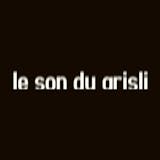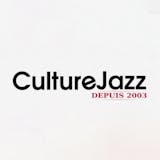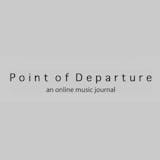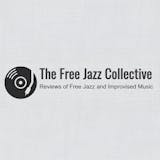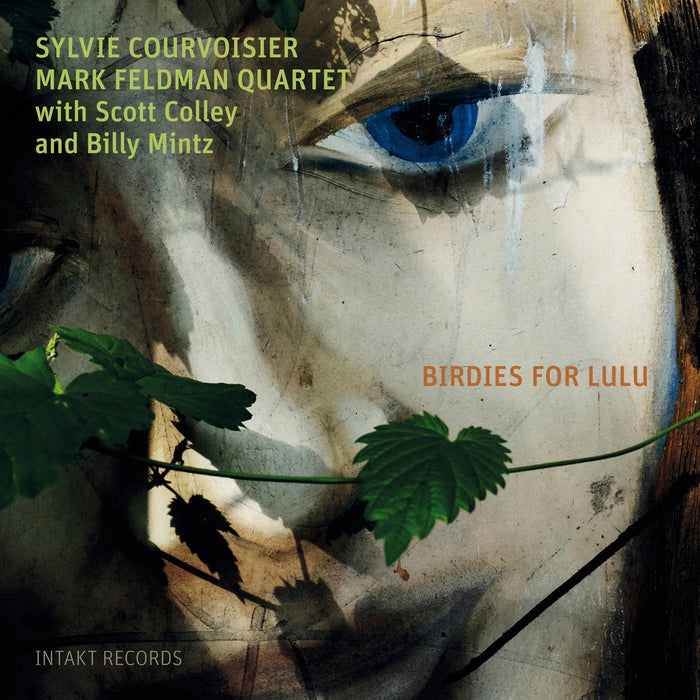
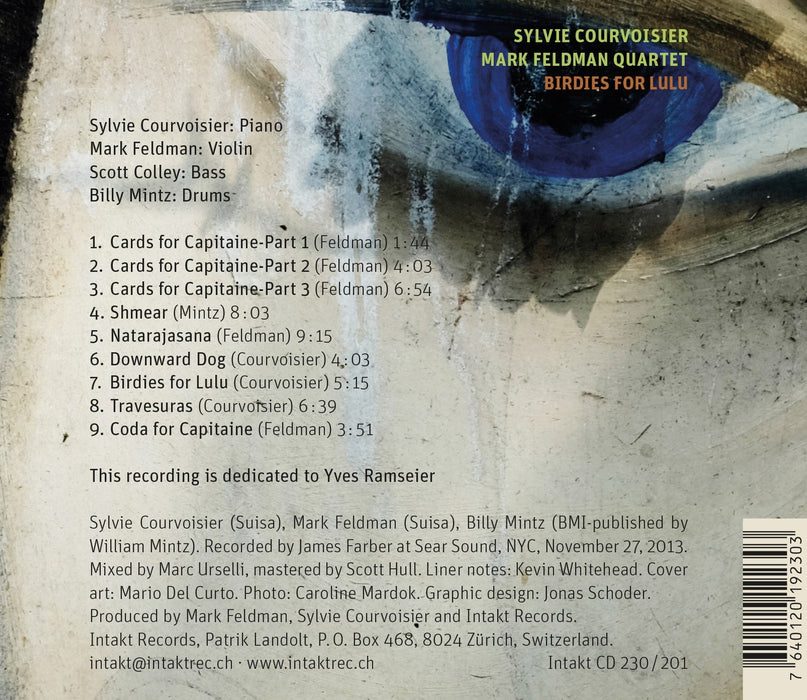
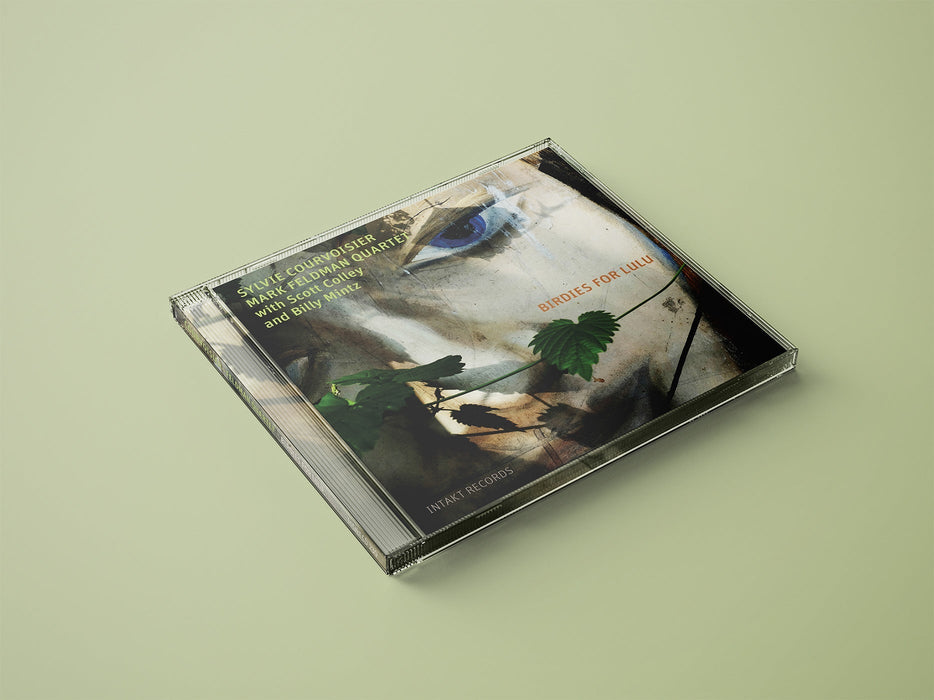
230: SYLVIE COURVOISIER – MARK FELDMAN QUARTET. Birdies For Lulu
Intakt Recording #230 / 2014
Sylvie Courvoisier: Piano
Mark Feldman: Violin
Scott Colley: Bass
Billy Mintz: Drums
More Info
"Birdies for Lulu" präsentiert ein neu besetztes Sylvie Courvoisier - Mark Feldman Quartett - mit dem gefragten Bassisten Scott Colley und dem Schlagzeuger Billy Mintz, und es ist ein Neuaufbruch. Mark Feldman: «Mit der Neubesetzung ging die Musik in eine ganz andere Richtung - und so sollte es ja auch sein, wenn die Hälfte der Band ausgewechselt ist.» Die Musik, die die Pianistin Courvoisier und der Violinist Feldman zusammen machen, nimmt oft Bezug auf Jazz und moderne europäische/ amerikanische komponierte Musik. Kevin Whitehead schreibt in den Liner-notes: «Auf Lulu hören sich diese rekombinanten Stämme frischer, präziser und konzentrierter an als bisher. Und auch witziger und swingender.»
Album Credits
Cover art: Mario Del Curto
Photo: Caroline Mardok
Graphic design: Jonas Schoder
Recorded by James Farber at Sear Sound, NYC, November 27, 2013. Mixed by Marc Urselli, mastered by Scott Hull. Liner notes: Kevin Whitehead. Produced by Mark Feldman, Sylvie Courvoisier and Intakt Records.
Pulsating cadences at the apex of jazz
Born in Lausanne, Switzerland in 1968, the pianist Sylvie Courvoisier had a conventional enough classical music education in conducting, composition and piano at the Conservatoire de Lausanne before moving to Brook-lyn in 1998, where she dived deeply into jazz, developing a number of musical formations, including two remarkable trios.
Abaton included her husband, the Chicagoan violinist Mark Feldman and cellist Erik Friedlander, and the all-woman Mephista was created with the veteran French bassist Joelle Leandre and US-Filipina drummer Susie Ibarra.
One of her first of a series of albums for the Swiss label Intakt was Lonelyville, recorded in her home city in 2006.
With Feldman and Courvoisier are the Detroit African-American drummer Gerald Cleaver, the Parisian cellist Vincent Courtois and the Tokyo-born Ikue Mori on electronics.
Feldman's ice-hot strings are at the centre of the 22-minute opener, Texturologie.
They cut through the harmonies above Courtois's more temperate cello and Courvoisier's grounding notes, while Cleaver's scattering drums keep the music earthen and solid.
Courvoisier rides her keys, buck-ing their wild sounds in a sudden thumping solo with Mori's tinkling timbral currents seething around her.
Cosmorama reflects the four con. tinents of the musicians but also the unity between the electric and the acoustic in Courvoisier and Mori's opening palaver.
Cello and violin have their moments of colloquy and Feldman touches the stars in his solo beside Courtois's pizzicato artistry.
If you wanted proof that these are so powerful contemporary jazz instruments, listen to Cosmorama.
Mori's sounds, like dripping crystal water, enfold Courvoisier's notes in Contraste 2005 before Feldman's serene unaccompanied solo, and the final, title track, with Cleaver's rumbling drums and Courvoisier's strident chords, has the bleak aura of a Lausanne blues.
By 2009 Courvoisier and Feldman were co-leading a lasting quartet with the Californian bassist Thomas Morgan and the drummer from New Haven, Connecticut, Gerry Hemingway, a leader in his own right and collaborator with Anthony Braxton, Marilyn Crispell and Wadada Leo Smith.
Their album To Fly to Steal was recorded in New York in July 2009. The bold drama of the opener, Messianenesque, is a sonic dance between the four instruments, with Feldman's spiky violin moving and sounding like the lone horn.
The pictorial soundscape of Whispering Glades is of a saltwater marsh at sunset suddenly disturbed by human presence.
Morgan's bass digs into the sodden earth.
Another audio-visual impression is Coastlines, with Feldman painting the margins of land and sea and Courvoisier's pounding notes stressing their jeopardy.
Feldman's quicksilver bow and Courvoisier's frolicsome runs mark The Good Life, with Five Senses of Keen exposing the violinist's melodicism and intense lyricism beside Hemingway's quiescent booms and Morgan's empathetic throbs.
Courvoisier's jerking, stop-start avenues of sound are at the worrisome heart of Fire, Fist and Bestial Wail.
By 2013, the quartet had two new members, with veteran New York drummer Billy Mintz replacing Hemingway and Angelang bassist Scott Collev in for Morgan, and they came together to cut the album Birdies for Lulu in New York in November of that year.
The opener and closer is Feldman's three-part Cards for Capitaine, dedicated to a late Swiss friend and written on index cards which were arbitrarily shuffled immediately before the recording.
Nothing mournful and full of zany humour with Colley's breathless bass brilliantly setting the pace.
Feldman's violin stomps and wails, Courvoisier's serpentine waves of sound roll and Mintz's drums shuffle, saunter and stroll.
From the heart of Europe to the apex of jazz she came, innovating all the way.
Hear her all the way through, but especially on this album's hearts-blood track, Shmear, where her pulsating cadences and sprints up the keyboard are joy to the ears.
Jazz brings many human miracles, and Switzerland in Brooklyn on a rocking piano is one of them.
Het kwartet van pianiste Courvoisier en violist Mark Feldman was altijd het toonbeeld van smaakvol gedoseerde geïmproviseerde muziek. Het is geen kritiek, maar soms klonk de muziek van het kwartet wel erg fragiel en serieus. Met de nieuwe, meer op jazz georiënteerde ritme-sectie van bassist Scott Colley en drummer Billy Mintz wordt de muziek swingender, relativerend en inderdaad ook humoristischer. Het lijkt erop dat met deze nieuwe opzet de beide leiders een grotere vrijheid krijgen om meerdere spanningsbogen tegelijk te suggereren. Het album kent mooie contrasten, die van lichtvoetige kamermuziek tot hard swingende jazz variëren. Gebleven zijn de briljante ritmische invallen van Courvoisier en de messcherpe, maar altijd fraai gearticuleerde interventies van Feldman, die dit kwartet zo sieren. Tegelijk is de muziek erg toegankelijk en een ideaal beginpunt voor wie nog huiverig is voor impro.
Sur fond de poursuite jazz, un violon désosse la corde : voici Mark Feldman. Les aigus d’un piano se déversent à grands flots sur la maison ternaire : c’est Sylvie Courvoisier. La contrebasse ronronne un blues racé : c’est Scott Colley. La batterie rectifie aux balais les effigies antiques : c’est Billy Mintz.
Le nouveau quartet Courvosier-Feldman implore au jazz de ne pas trop noircir la page. Y résistent les écritures contemporaines d’antan, le fantôme de Schubert, les traits vifs et saillants, les épandages d’aigus d’un duo toujours aussi éblouissant. De ces compositions aux mille-facettes (soit l’art de sauter du coq à l’âne sans s’en apercevoir), on retiendra l’intensité du jeu, les basses paroles murmurées, les lances tranchantes. Charme et légèreté ici. Encore plus que d’ordinaire.
https://grisli.canalblog.com/archives/2014/11/21/31000372.html
Swiss-born, New York-based pianist Sylvie Courvoisier can be hard to pin down. She covers a wide gamut with equal conviction, from jazz-inflected riffs to airy romanticism, via arrhythmic improv and chamber abstraction, enacted both at the keyboard and within the guts of the piano. With so much terrain at her disposal, it's no wonder that she boasts such a breadth of collaborators, stretching from Lotte Anker to John Zorn, with over 30 leadership dates in her discography.
However, surprisingly, she hadn't tackled the piano trio until, at Zorn's behest, she put together the group on Double Windsor of bassist Drew Gress and drummer Kenny Wollesen. Juxtapositions of contrasting elements form an important strand in Courvoisier's work, whether they be of mood, meter or texture. It's clear she has chosen her partners well as they make the continual switchbacks appear natural and unforced. With his rich sound and strong melodic sense allied to rhythmic nous, Gress helps ensure that Courvoisier's mysterious charts, full of unexpected twists and turns, remain anchored in the jazz tradition. In that he's aided by Wollesen's mastery of timbre and broken grooves, which lengthen and play with time, bending it to the
group will. They get things off to a fine start on the title number as a darkly rolling ostinato, which achieves thrilling immediacy when doubled by bass and piano, alternating with pensive ruminations. It cuts to a melancholy bowed bass melody that seems to be from a different piece entirely, prior to a return of the opening gambit to finish what must be one of the piano trio tracks of the year. There's little sign of a dip thereafter either, as solos and improvisation are so well incorporated into the ingenious writing that they can escape notice, so integral are they to the magnificence of the overall flow.
That same love of juxtaposition becomes a credo, seemingly shared by the whole outfit, in Courvoisier's quartet with husband/violinist Mark Feldman on Birdies for Lulu. Only here the range of interjections is wider still with more of an even split between jazz, contemporary classical and improv tropes. It's most obvious on the four parts of Feldman's "Cards For Capitaine", created by giving instructions/notation on a series of cards, randomly reordered prior to performance. The first part features a "Dance of the Sugar Plum Fairy"-type shuffle while subsequent installments offset open interaction with fast scuttling rhythms and delicately strummed piano strings and plaintive violin. Drummer Billy Mintz' "Schmear" continues the thesis as a folksy dash abruptly switches first to churchy piano chords then to later sections showcasing Feldman's husky violin and Courvoisier's rollercoaster piano. After a captivating intro in which Courvoisier counterbalances prepared and unprepared segments of the keyboard, Feldman's lovely "Natarajasana" evokes Arvo Pärt's "Fratres" in its combination of mournful violin and somber hymnal, briefly illuminated by bassist Scott Colley's tuneful pizzicato. In fact, every composition is both complex and multi-faceted, exquisitely executed with sly humor amid the pathos and charm.
Le duo Sylvie Courvoisier/Mark Feldman retrouve ici une section rythmique, et quelle rythmique !, pour un disque assez époustouflant. Une musique brillante, foisonnante, presque échevelée parfois, dynamique ou au contraire concentrée, pleine de surprises et de références, une musique savante et de très haut niveau qu'on écoute oreilles grandes ouvertes ! (le quartette va se produire prochainement en France, notamment à Banlieues Bleues).
http://www.culturejazz.fr/spip.php?article2553
Swiss pianist Sylvie Courvoisier, having lived in the United States for nearly two decades, is something rare: a musician who’s sustained her European identity and become an integral part of the American scene. That dual nature is captured on Double Windsor and Birdies for Lulu. On both of these excellent albums, Courvoisier sticks to a space she’s explored since the beginning of her career stateside – somewhere between written and improvised music, a hybrid of contemporary classical music, jazz, and the avant-garde. Years ago she married into New York’s creative-music community (her husband is violinist Mark Feldman), but she’s carved out her own spot on what was once the Downtown Scene, that now disparate crew of players who, despite splintering across the boroughs, are still routinely found in the East Village, especially at John Zorn’s room, the Stone. You might lump Courvoisier (who’s 45) in with the generation between, say, drummer Tyshawn Sorey (34) and guitarist Marc Ribot (60).
In conventional jazz parlance, Double Windsor is her first piano trio. There have been other three-pieces in her career – including Mephista, with Ikue Mori and Susie Ibarra (see Tzadik 7704 and 7711), and Abaton (see ECM 1838), with Feldman and Erik Friedlander – but after experimenting with a number of different combinations, she called on Drew Gress (bass) and Kenny Wollesen (drums), a formidable pair.
Double Windsor is a rich and exciting debut – a just off-center, and wonderfully fertile version of what a more orthodox piano trio might be. Courvoisier’s nine compositions fuel this idiosyncratic point of view. There’s the through-composed. There’s material that straight away opens up to improvisation. There are melodies in the jazz tradition and spare, barely notated bits that fuel complete freedom.
Nothing stays still for long; there’s a lot of writing. The pieces are often packed with jumpy lines and little detours (Courvoisier calls them “interruptions”). The opener, and title piece, nearly contains it all: the dense, driving pulse (an ostinato in 10/8), constant forward motion, tightly wound figures, and a series of sections framed by improvisation. Each motif and mood feels embedded in the overarching design, rather than – again, in conventional jazz parlance – returning to a head.
This push and pull, this elastic relationship to time, form and drama seems second nature to Gress and Wollesen. The little pathways between a line and an improvisation aren’t stitched: they’re an organic part of things. In other hands, Courvoisier’s music could easily feel overwritten – as a lesser rhythm section clunks toward another programmed bit. But it never does.
So “La Cigale” goes from neat, French-flavored post-bop, to a Courvoisier improvisation (and extended technique) which folds into a three-way conversation, the pulse bending, as Gress and Wollesen follow. Or “Corto,” with its collective declaration immediately turning into a real cooker. Everything is in motion, even in something akin to a meditation, “To Fly to Steal”: a short line, bass alone, enter piano and drums, and Courvoisier steps out front, her colleagues now with her, turning the piece inside out.
With its layers of writing and improv, Birdies for Lulu, the third disc from Courvoisier’s quartet with Mark Feldman, is an equally complex artifact. To my ears, however, it often feels freer and, oddly, even more in line with the jazz tradition. Drummer Billy Mintz and bassist Scott Colley are, like Wollesen and Gress, powerful foils, but Courvoisier outdoes herself on the real swingers here – Part 2 of Feldman’s suite, “Cards for Capitaine,” “Downward Dog,” or “Shmear,” Mintz’s sole contribution. Birdies for Lulu is the first date with a refashioned lineup (Colley in for Thomas Morgan, Mintz for Gerry Hemingway). It’s a real boon.
What binds this music together? In his excellent liner notes, Kevin Whitehead characterized it this way: “frequent unisons involving three pairs of players, the use of pure sound within or alongside tonal play, enigmatic shifts in direction, and Mintz’s birdlike brushes.” There is a backstory to much of the program. Feldman’s suite is written for a late Swiss friend and ancient languages scholar. It was written quickly on index cards. When they went to record, Feldman shuffled them. Courvoisier’s title piece was conjured up after she was asked to write bird calls for two mechanical birds. Courvoisier’s “Travesuras” alludes to an especially inspiring Mario Vargas Llosa novel.
If Double Windsor is terrifically alive, Lulu is, too, though it’s also filled with longer, more contemplative stretches. “Travesuras,” which shares Windsor’s jumpy edges (unison lines, multiple interruptions), still feels lighter, less intense.“Birdies for Lulu,” the piece itself, is more like new music: fragments and whole tones, formal, through-composed terrain. It is also immensely fluid.
To my mind, Feldman’s “Natarajasana,” is at the heart of things. T...
It's a surprisingly placid block in the Gowanus section of Brooklyn where Sylvie Courvoisier makes her home. One neighbor's postage-stamp front lawn has a fishpond installed. Another is overrun with grape vines. Two more sport tall prairie grass. The scene was made all the more serene on a summer afternoon by the familiar sounds of a familiar violin emanating from an open, upstairs window.
"It's changed so much," Courvoisier said of the neighborhood where she and Mark Feldman (the man responsible for those violin lines floating down to the street) have lived for six years, joined more recently by a long-haired cat named Lulu. "When we moved here they were taking off hubcaps and stealing tires."
It's not a home she expected to have, or had even dreamed about, growing up in Switzerland. But since moving here in 1998, the pianist has become a fixture of the avant-improv scene. Her enormously tasteful hand at composing and arranging has contributed to her leading or co-leading more than a half dozen projects, including work with Feldman, saxophonist Ellery Eskelin and the remarkable trio Mephista with drummer Susie Ibarra and electronicist Ikue Mori and her deft musicianship and heady use of preparations to the instrument have been an unmistakable voice in projects with Jacques Demierre, Yusef Lateef, Lucas Niggli, Herb Robertson, John Zorn and many others. But had it not been for a chance encounter in Germany, she might never have made her mark on the Downtown scene.
"I met Mark in Baden-Baden," she said. "I didn't really want to move but I was building a relationship with him. I wanted a break from where I was but I never wanted to be a musician in New York."
Another thing previously absent from Courvoisier's life agenda was forming a classic piano/bass/drums band, but that's just one of the many things occupying a busy autumn for her. The recently released Double Windsor (Tzadik) with bassist Drew Gress and drummer Kenny Wollesen finds her stepping into the legacy of Paul Bley and Bill Evans. She had, of course, found herself in the form before-the excellent Passaggio with Joëlle Léandre and Susie Ibarra (Intakt, 2001), but the band on Double Windsor is billed as the "Sylvie Courvoisier Trio" and the compositions are all hers.
"I never wanted to do a piano trio," she said. "I love piano trios but there's Ahmad Jamal, Keith Jarrett-I'm a fan of all of it. There are such great masters I didn't need to do it."
It took years of encouragement from saxophonist and Tzadik head John Zorn and when she finally took the challenge she proceeded carefully. The main concern, she said, was finding the right bandmates.
"With Kenny and Drew I really found the balance," she said. "I felt comfortable with them. When you have a great bassist and drummer you don't have to work so much. I want to work with this trio for a while. It's my first piano trio so it's important. It's the whole tradition
as a pianist. It gives you this freedom. The piano is always in front. There's all this past, these references. There's so many different vibes and you can deal with it or not deal with it. It's an important band for me. It's a big step with this trio. It's something I hadn't dealt with so much."
The trio will play Roulette this month and she'll be marking the release of an album of duets with Evan Parker (Either Or And, to be issued on Relative Pitch) at The Stone. Just prior to those dates, she and Feldman will be at the Village Vanguard, playing in duet opening John Zorn's week of different ensembles playing his Masada compositions. Then she's off to Paris for a preview of a reworking of Stravinsky's The Rite of Spring she's taking on with dancer Israel Galvan before a six-week tour with the quartet she co-leads with Feldman, whose Birdies for Lulu (Intakt) was released in June. The album's name comes from Courvoisier's cat's penchant for staring into the piano case, looking for the source of the sounds when Courvoisier plays in the upper register.
"I like it a lot," she says of the third album by the quartet, rounded out by bassist Scott Colley and drummer Billy Mintz. "It's funny, it's kind of Dada-esque."
There are indeed absurdist surprises to be found in the album. The coda for Feldman's suite Cards for Capitaine has Courvoisier (at Feldman's direction) objecting in Italian to having to play the piece again. And her own "Downward Dog", also heard on Double Windsor, gets a more lyrical treatment.
"It's very different with the quartet," she said. "Billy and Kenny are so different. I admire them so much. And Mark brings the melody that my trio has less of. He is more melodic than me."
The duo with Parker might include some of her most extreme playing of the three discs. Courvoisier made her name, at least in part, as one of the carefully deliberate users of preparations to the piano (bolts, pans, tape and other items placed on or affixed to the strings to alter the sounds made when they're struck). The technique is ge...
Zoals met Courvoisier & Feldman's vorige cd's, mogen we meesnoepen van zeer integer compositie- en ensemble-werk. Het is proeven van alle werelden: Europese schriftuur; abstracte denkwijze op Amerikaanse drive en grooves, en omgekeerd. Het is er allemaal: plechtige melodieën, die zich oplossen in concrete, beeldende klanken, de snaarinstrumenten in mekaar opgaand in haardunne samenzang, tot de piano assertief voor opschudding zorgt. Deze vier meestermuzikanten brengen klasse. Terwijl Feldman's composities een zekere tristesse en wereldbeschouwing uitdragen, gaan die van Sylvie Courvoisier er iets scherper tegenaan, maar ze kunnen de rollen ook omdraaien: een perfecte compliciteit. Wat kunnen deze artiesten met zulk een breekbaar concept toch enorme kracht uitstralen. Geen festival-act, zegt u? Deze muziek vertegenwoordigt (met o.a. Aki Takase, Barry Guy & Lucas Niggli) veel meer wat er zich in de Europees-Amerikaanse hedendaagse muziek afspeelt, dan al de neo-funk en pseudo-wereldmuziek, die ons door de booking-agents wordt aangepraat.
One’s listening mind can never again be a blank slate, years of hearing and listening have etched grooves, some long and trailing, some sort of wandering off aimlessly, and any sound entering has the tendency to activate one or more of these grooves thus creating a pattern of sometimes recognizing but always anticipating the next sound. A skillful player plays with this giving and not giving, resolving and thwarting, challenging and rudely interrupting, all this guided by his own voices and sent out to other voices, other rooms. In this missive we find ourselves with Sylvie Courvoisier on piano, Mark Feldman on violin, Scott Colley on bass, Billy Mintz on drums.
They begin with a suite, “Cards for Capitaine”, according to the liner notes dedicated to an old friend, an expert in Sanskrit. Old languages come to us in shards and fragments, torn loose from their moorings and it is up to us to find meaning, renew acquaintance. Mark Feldman sketched musical segments on index cards and let indeterminacy coupled with his own evoked memories combine to create a barrage of snippets, some short and unresolved some drawn out. Let me give you some impressions in poor words : on a repeating left hand theme, bows scrape and weave and smear, pizzicatos punctuate, bass takes over repeating undulations to spread a bed for romantic violin and Debussy-esque skittering, leading to strumming the piano and coaxing the violin into the gentle calm of an uncluttered mountain lake, strings are pulled and bowed and upon mallet sounds piano enters the purely romantic and points the violin and bowed bass into the hazy distance. There be whales out there. And shifting shoals of herring. Then over to the driving pulse of “Shmear”. Not for long though, the piano finds the beginnings of an anthem, gets bored quickly and hands things over to other strings, low bass, sparse sounds, Shostakovich country (to me), the violin launching into a mad melody and the piano coming in from the left and bringing the whole to a rapturous boil. And back to the unfinished anthem, not finishing it this time.
The quiet center, the eye of the hurricane bears the name of a yoga posture and holds it nicely. Prolonged breathing (though no wind instruments are present) with a subtle bass solo, muscles relax, tendons lengthen : “Natarajasana” is a glorious heart-opener that asks us to be stable yet at ease, committed yet non-attached, and fully engaged yet at peace.
“Downward Dog” brings you back to life after a long and tiring day at the office and allows Sylvie Courvoisier ample space for a dense solo. Wereupon “Birdies for Lulu” call and take you out in the woods where call and response flitter through the dappled shadows. Messiaen anyone? “Travesuras” then, playing games, hopscotching, hithering and thithering and the final track “Coda for Capitaine” brings us round to the beginning, riverrun, the eternal present wherein jazz exists. “Jazz is and always has been more of an attitude than a style.” (Art Lange).
This is highly original and new music, steeped in tradition but treated with the measured, ordered lucidity that brings ineluctable joy to the paradox of controlled freedom. Listen.
https://www.freejazzblog.org/2014/09/sylvie-courvoisier-mark-feldman-quartet.html
Kraftvoll swingen die vier zu Beginn drauf los. Geiger Mark Feldman und Pianistin Sylvie Courvoisier haben ihrem Quartett einen Relaunch verpasst und mit dem Bassisten Scott Colley und dem Schlagzeuger Billy Mintz frische Kräfte ins Boot geholt. Insgesamt ist ihre Musik kompakter geworden. Fein aufeinander abgestimmtes Tun bestimmt die Sounds. Nach dem jazzigen Beginn ein plötzlicher Bruch, hingeworfene Klangpixel zwischen Geige und dem erstklassigen Rhythmusteam. Immer wieder werden Bezüge zur zeitgenössischen Kammermusik hergestellt, fast romantisch wirken manche von Courvoisiers Pianoexkursen. Beispielhaft im titelgebenden Stück Birdies for Lulu. Ganz wunderbar dabei Feldmans sehnsuchtsvolles, wie von mühsam unterdrückter Leidenschaft geprägtes Geigenspiel. Insgesamt ein höchst empfehlenswerter Tonträger, der sich schlüssig in die Serie hervorragender CDs einreiht, die Feldman und Courvoisier für Intakt eingespielt haben.



